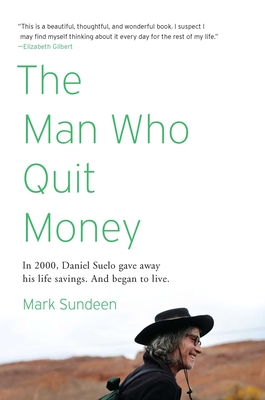A Walden for the 21st century, the true story of a man who has radically reinvented "the good life".
In 2000, Daniel Suelo left his life savings-all thirty dollars of it-in a phone booth. He has lived without money-and with a newfound sense of freedom and security-ever since.
The Man Who Quit Money is an account of how one man learned to live, sanely and happily, without earning, receiving, or spending a single cent. Suelo doesn't pay taxes, or accept food stamps or welfare. He lives in caves in the Utah canyonlands, forages wild foods and gourmet discards. He no longer even carries an I.D. Yet he manages to amply fulfill not only the basic human needs-for shelter, food, and warmth-but, to an enviable degree, the universal desires for companionship, purpose, and spiritual engagement. In retracing the surprising path and guiding philosophy that led Suelo into this way of life, Sundeen raises provocative and riveting questions about the decisions we all make, by default or by design, about how we live-and how we might live better.
Read an interview about Suelo HERE.
Lynn says:
"The Man Who Quit Money blends cultural and economic commentary, philosophy, wilderness adventure and psychology into a page-turning story that, for this reader, lodges into your consciousness as a 3-way intimate conversation between author (Mark Sundeen), his subject (Daniel Suelo) and the reader (albeit with the reader's 'input' on a silent but still very active plane, you might say). In short, it's the sort of biography that not only digs beneath the surface of the individual life described, but that holds up a very clear mirror to the times that that person is living in.
Suelo's trajectory, from his evangelical Christian roots, his studies at CU and along a winding spiritual path bringing him, one might say inexorably, to his paradoxically hermetic and socially engaged life today might well recall for some the stories of Christopher McCandless (the subject of John Krakauer's Into the Wild), Peace Pilgrim back in the '70s, of Mark Boyle (Moneyless Man: A Year of Freeconomic Living ), Henry David Thoreau or, in some respects, even of that famous moneyless man, 'El Poverello', St. Francis of Assisi.
I vividly recall reading about Suelo in Jason Blevin's article for The Denver Post back in late 2009; "Moab Man Embraces Simple Life Living in Cave". At the time I was taken aback by the strong reaction the article received by some... that this guy was some kind of 'parasite', living as he did out of dumpsters and utilizing the discards of the capitalist culture he eschews. Sundeen's book makes such assessments a little harder to assert, given the complexity of this story.
I have to say I am one of those with a reaction more of wonder and curiosity as to how any of us might learn to live more simply and with a more profound connection to the natural world. Evidenced by the surge in interest here in Denver around 'backyard homesteading' with beginner gardeners, beekeepers and chicken-keepers popping up everywhere, the 'Occupy' encampments comprised often of otherwise unemployed souls seeking community amongst their peers, as well as experimentation with bartering and freecycling, it's clear that Suelo is on to something. For anyone who's ever spent time away from the city's relentless monetized hold on our psyches, whether for a short weekend backpacking trip or for months or years off the normal grid, the liberating feeling of stepping 'outside the box' of the oft assumed 'end of history' globalized economy we take as an immutable law of the universe. Daniel Suelo's story will bring up questions and maybe even a few answers as we navigate our way through the current permutation of our personal and collective relationship with that good ol' 'root of all evil', money."


No comments:
Post a Comment